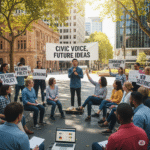Lucknow, 2025 — In Uttar Pradesh (UP), a state marked by its diverse demographic and complex socio-political fabric, civic engagement has emerged as a crucial element in empowering the political landscape. As citizens increasingly participate in the democratic process beyond just voting—through activism, community organizing, and dialogue—there is a transformative shift in how policies are shaped and governance is perceived. This article explores the pivotal role of civic engagement in strengthening democratic processes and enhancing accountability in UP.
Enhancing Democracy through Civic Participation
- Increased Voter Turnout
- Impactful Engagement: UP has seen a significant rise in voter turnout in recent elections, a testament to growing political awareness and participation. This increased engagement has led to more competitive elections and a demand for greater accountability from elected officials.
- Educational Initiatives: Efforts by various NGOs to educate voters about their rights and the importance of their vote have contributed to this uptick in participation.
- Community-driven Initiatives
- Local Governance: The active involvement of citizens in local governance, through ward committees and gram sabhas, has been crucial in tailoring government programs to better fit community needs.
- Example Projects: Initiatives such as community policing and local health campaigns have been particularly successful due to strong local involvement.
Civic Engagement’s Role in Policy Formulation
- Public Consultations
- Inclusive Policymaking: The state government has increasingly adopted public consultations as a part of the policy-making process, allowing for a broader range of inputs and enhancing the legitimacy and effectiveness of policies.
- Impact: Policies regarding urban development, public transport, and education reform have been shaped significantly by feedback from these consultations.
- Transparency and Accountability
- Right to Information (RTI): The effective use of RTI acts by UP’s citizens has promoted transparency and held public officials accountable, deterring corruption and inefficiency.
- Social Audits: Community-led social audits of government programs have become a powerful tool for ensuring proper implementation and management of resources.
Challenges to Civic Engagement in UP
- Socioeconomic Barriers
- Diverse Challenges: While civic engagement is growing, significant sections of the population, especially in rural areas and among lower socioeconomic groups, remain disengaged due to lack of education, resources, and access to information.
- Bridging the Gap: Continuous efforts are needed to ensure that civic education and engagement opportunities reach these groups.
- Political Resistance
- Systemic Inertia: There is often resistance from traditional political structures to increased civic participation, as it may threaten established power dynamics.
- Overcoming Resistance: Sustained advocacy and legal reforms are required to counter these challenges and promote a more inclusive governance model.
Looking Ahead: Strengthening Civic Foundations
- Youth Involvement
- Empowering Young Voices: With a significant portion of UP’s population under 30, empowering young people to take part in civic activities is vital for the future of democratic engagement.
- Platforms for Participation: Schools and universities are increasingly incorporating civic education into their curricula, encouraging students to engage in political discussions and community service.
- Technology as an Enabler
- Digital Platforms: Leveraging technology to facilitate civic engagement, such as through online forums, e-petitions, and mobile apps, can help bridge the gap between government and citizens.
- Social Media: These platforms provide a powerful tool for mobilization and awareness-raising, enabling real-time participation and feedback on governance issues.
Conclusion: A Call to Action
Civic engagement in Uttar Pradesh is proving to be a fundamental driver of political empowerment and democratic deepening. By fostering an informed, involved, and proactive citizenry, UP can continue to transform its political landscape, making it more responsive and representative of its diverse populace. As civic engagement flourishes, so too does the potential for UP to set a benchmark for democratic governance in India.



















